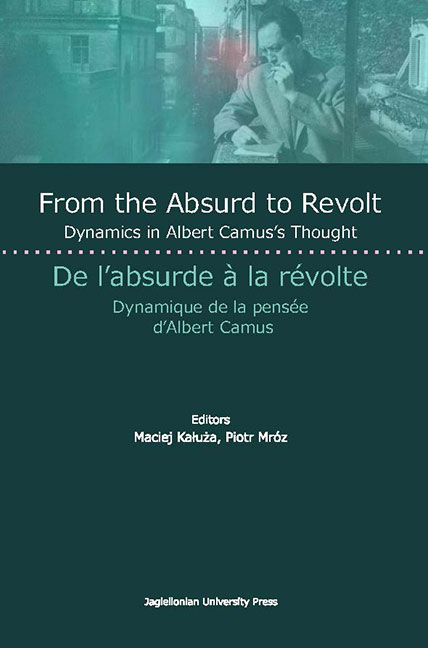Book contents
- Frontmatter
- Contents
- Introduction
- Part One From the Absurd to Revolt, Analysis of Sources for Camusian Concept of Revolt
- Profound Indifference: The Source of Revolt in the Early Writings of Camus
- Un personnage emblématique : Caligula, ou la pensée en action de l'absurde à la révolte
- La Peste, de l'absurde à la révolte : les limites de l'engagement
- Camus’ Religious Revolt in The Plague
- Lire et écouter pour écrire L'Homme révolté
- The Dynamics in Meaning of Absurdity and Revolt: between La liberté absurde and L'absurde et le meurtre
- Part Two Camus's Revolt in Contemporary Analysis
- Part Three Camus's Revolt in Comparatistic Studies
Camus’ Religious Revolt in The Plague
from Part One - From the Absurd to Revolt, Analysis of Sources for Camusian Concept of Revolt
Published online by Cambridge University Press: 22 December 2017
- Frontmatter
- Contents
- Introduction
- Part One From the Absurd to Revolt, Analysis of Sources for Camusian Concept of Revolt
- Profound Indifference: The Source of Revolt in the Early Writings of Camus
- Un personnage emblématique : Caligula, ou la pensée en action de l'absurde à la révolte
- La Peste, de l'absurde à la révolte : les limites de l'engagement
- Camus’ Religious Revolt in The Plague
- Lire et écouter pour écrire L'Homme révolté
- The Dynamics in Meaning of Absurdity and Revolt: between La liberté absurde and L'absurde et le meurtre
- Part Two Camus's Revolt in Contemporary Analysis
- Part Three Camus's Revolt in Comparatistic Studies
Summary
“No plan ever withstands first contact with the enemy.”
Colonel John Cox, UsAF RetiredINTRODUCTION
In Camus’ The Plague, Father Paneloux delivers two sermons to the population of oran. neither sermon practically helps the people and each has a different theological foundation. Camus uses a theodicy dilemma to illuminate the limits and dangers of theology (and all disciplines that can linger only in the theoretical, philosophy and science included). in this paper, i will briefly describe both sermons and the event that triggers a change in theology for Father Paneloux. From this, i will develop a “metaphysical flow chart” that will track the rise of the Absurd, the Father's reaction, and his attempt to deal with it. After illuminating the absurd and the resulting revolt against it, i will offer several possible theological foundations that Camus may have been comfortable with, or even pointed to as actually being helpful. This also helps the reader understand Camus’ rather difficult statements about not believing in god and not being an atheist.
PART I
After delivering several short sermons of instructions - these sermons appear to be essentially public service announcements - Father Paneloux crafts a theological response to the plague based in Augustine and justice. After witnessing the suffering and death of a child, he retools and crafts a second sermon based in Tertullian and the mystery of god with an “all or nothing” demand. in the end, in one of Camus’ most brilliant word uses, Paneloux dies “a doubtful case.” it is both possible that he died of plague and that he died a heretic in the eyes of Rome.
First, who was Father Paneloux? we know quite a bit about him from Camus. He was: Roman Catholic, Jesuit, well-informed on Augustine, Pied-Noir, “militant” (which i read as orthodox), a large man built to preach, intelligent, meticulous, introverted, and deeply devoted to his faith and humanity.
As the central religious character in The Plague, he is no strawman. situated in north Africa, he is a fine representative of French Catholicism and Camus is well-equipped to use him in the narrative. with a Jesuit education and north African in the tradition of Augustine, Paneloux is a solid representation of the Christian response to the plague (and all it stands for in the novel: the absurd, fascism, nazism, literal plague).
- Type
- Chapter
- Information
- From the Absurd to Revolt/De l'absurde a la Revolte , pp. 63 - 78Publisher: Jagiellonian University PressPrint publication year: 2017



